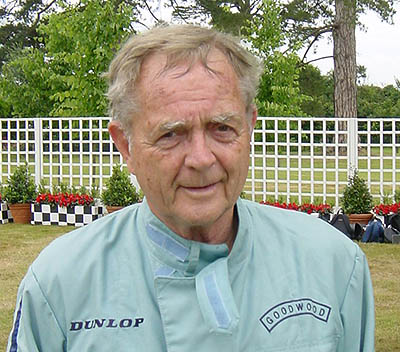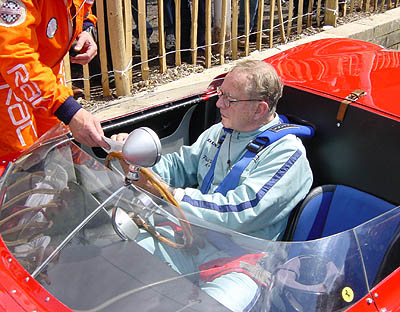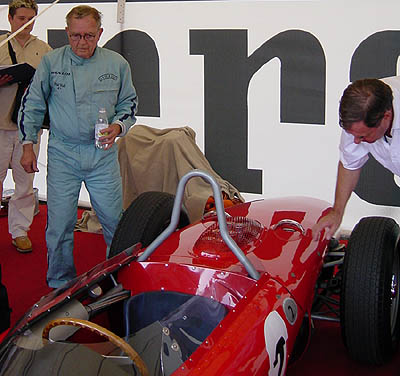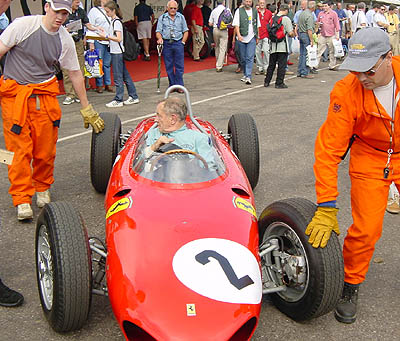


31/08/2008
FEATURE BY MIKE LAWRENCE
 |
Phil Hill was a quiet, courteous and cultured man who never received proper credit for winning the 1961 World Championship. Wolfgang von Trips had gone to Monza leading the title chase and was killed early in the race, which left Hill without a rival. America's first F1 World Champion should have then returned the hero to the final round, the US Grand Prix. Having secured both titles, however, Enzo Ferrari withdrew his team from the race, an act of selfishness which characterised the man. America was, after all, Ferrari's main market and the reason why the marque had prospered.
The facts are: there were eight rounds in the World Championship with the five best scores to count. Hill had 29 points to von Trips's 33, so they were not far apart with two races to run. Monza was the only occasion in the 1961 WC when von Trips was the quicker man during practice. Phil must be given some credit for dying in his own bed, after enduring Parkinson's for some years, he was not prone to crashing. He was also very, very quick.
Phil was born in Miami in 1927 and was orphaned at an early age. He was raised by an aunt in Santa Monica, California, and though she did her best, his childhood was not happy. When he was 12, his Aunt bought him an old Ford Model T and the official version is that he drove it around fields, but he told me that he used to drive it everywhere. He said, "Every once in a while a cop would pull me over, a twelve-year-old is not that hard to spot. I'd be given a telling off and promise not to do it again, until the next time...."
He had no particular ambition as a kid, he did not shine in school either, but he enrolled at the University of Southern California to study business administration. That did not last long, he found himself drawn to things mechanical. After flirting with workshops preparing quarter-mile Midgets, he had the odd race, he landed a job with a motor dealer who intended importing Jaguars. Phil was sent to England to do a course on Jaguar maintenance and returned to California with one of the original batch of XK120s, one with an aluminium body which really would do 120 mph.
 |
From the start it was clear that he was an exceptional driver and he was soon offered other people's cars to race. Luigi Chinetti, Ferrari's USA importer and himself a three times winner at Le Mans, cut Phil a special deal on a Ferrari. It was an inspired move.
Chinetti did more than anyone to found Ferrari's fortunes and he had Enzo's ear. During the late 1950s and early 1960s an amazing array of American talent crossed the Pond. It began with Tom Cole, the forgotten one, yet third at Le Mans and fourth in the Mille Miglia. Then came Carroll Shelby, Phil and others like Richie Ginther, Masten Gregory, Dan Gurney, Jim Hall, Lance Reventlow, Roger Penske and Lloyd Ruby. Those are just some of the headline names, there were others.
While some people tried to make an artificial bridge between America and Europe (like the Monzanapolis races) American drivers made their own way and made significant contributions.
Phil Hill's arrival in Europe in 1956 was coincidental with my first awakening to motor racing, but I never saw him race in period, only in Historics. The motor racing media was so thin in 1956 that most of us had no idea who Hill, P, was, even when he won the Swedish GP, a round of the World Sports Car Championship.
Fangio gave only one interview to a British publication during his career, Farina and Ascari gave none. There was not the cult of celebrity there is today, unless you were Elizabeth Taylor and Richard Burton, and newspapers and magazines were thin affairs. Phil Hill remained a rather shadowy figure and there grew a story that he inherited the World Championship and that is not true.
Phil raced sports car for Ferrari until Peter Collins was killed in 1958 and Phil had his chance at Monza. He was blisteringly quick as he was at Morocco, the Moss and Hawthorn showdown. Hill was much quicker than his team-mate, Mike Hawthorn, but slowed to allow Mike to take second and so clinch the title.
Phil Hill is a man who gifted a World Championship, he did not inherit one.
 |
Hill based himself in Italy and was one of the few top drivers who could have benefited from the cultural riches of that country. He achieved many firsts, the first American to win the F1 World Championship, the first to win Le Mans, he won it three times and won Sebring three times.
For 1963, he and Giancarlo Baghetti left Ferrari to join ATS, staffed by ex-Ferrari people and a disaster. He was never bitter about a decision which ended his top-line career, but said that the Italian economy took a dump and ATS went with it.
For 1964, he drove F1 for Cooper, which had run out of ideas. Phil and John Cooper did not hit it off and, knowing them both, I can understand why. As my friend, Eoin Young, has written, Hill's relationship with Bruce McLaren was different.
Phil's swansong was at Brands Hatch in 1967 when he and Mike Spence gave Jim Hall's Chaparral its only World Sportscar win, in the BOAC 500. I didn't see that, but I had been walking down the Strand in London when the car went by me, on the back of a trailer. It was covered and the van unmarked, but it had to be a Chaparral because there was this bloody great wing sticking out.
In his later years, Phil became familiar at the Goodwood Festival of Speed and the Revival Meeting and so I got to know him a little. He was also a contributor to Road & Track and there were occasions when he flew the Atlantic to drive cars at the Goodwood Motor Circuit for his journalism. This was ironic, because he'd hardly ever raced in England.
There was another reason why he tipped up in my neck of the woods. His son, Derek, also raced and he received advanced tuition from Rob Wilson at Goodwood. Rob had become hooked on racing in 1961 and his all-time hero was Phil Hill. Rob, a superb tutor, was beside himself to become friends with Phil.
 |
Phil did not inherit a World Championship, he earned it. He was a very, very quick driver in a Formula One car and while he is recorded for his many achievements in sports car racing, he did everything in F1 that his cars, and politics, would allow him.
If Enzo Ferrari had been a more complete human being, he was lacking in many areas, Phil would have been allowed to have driven his T156 'Sharknose' at Watkins Glen in 1961. America's attitude to F1 may have changed. It is possible that Phil would have won, it is probable that he would have impressed.
Americans love success, which is why they are top in games that they invented and nobody else wants to play because they are too boring. The World Series in baseball is like finding the funniest man in Norway. Anything that needs cheer leaders is boring, by definition. Had Enzo Ferrari not been such an arsehole, and he was, Phil Hill could have changed the history of the sport.
Mike Lawrence
mike@pitpass.com
To check out previous features from Mike, click here